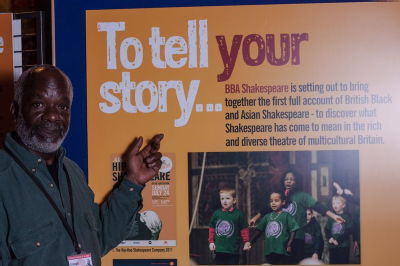British Black and Asian Shakespeare: Untold Stories
Our To Tell My Story exhibition has sketched a broad narrative; now our task is to provide the statistical and first-person detail – for which we rely very much on artists and audiences sharing their memories. And in this, the interplay between theatre, cinema and broadcasting is important.
In the 1990s, the talents of young, classically skilled and ethnically diverse British actors became evident internationally through Kenneth Branagh’s films. But the relationship between broadcasting and multi-ethnic Shakespeare dates from at least 1930, when although Paul Robeson rejected offers to make a sound film record of his taboo-breaking first Othello, he used radio to spread its impact. From London, he told American listeners that Othello’s colour was at the heart of the tragedy, that he was playing the role in Britain to avoid prejudice at home, and that he nonetheless hoped to take Othello to New York: ‘In the enlightened sections of the United States there can be only one question: is this a worthy interpretation of one of the great plays of all times? I sincerely trust that I shall see you in October.’ It would in fact take thirteen years.
Thanks to the BUFVC Shakespeare database, and such trailblazing researchers as Stephen Bourne, it’s already possible to trace the presence of several West Indian and African-American actors in early broadcast productions. Perhaps the first great breakthrough was Robert Adams’ appearance as the Prince of Morocco in the BBC TV Merchant of Venice in 1947. In 1955 the American Gordon Heath was Othello in Tony Richardson’s live TV production – the first Shakespeare I ever saw, incidentally, and unforgettable. In 1958, amidst great publicity, Richardson cast the Trinidadian singer Edric Connor as Gower in Pericles at Stratford, and R.D. Smith gave Errol John (the author of Moon on a Rainbow Shawl) the part of Cerimon in his radio version of the same rare play.

Joseph Marcell at the To Tell My Story exhibition.
Black artists’ careers necessarily crossed media and bridged distinctions between ‘entertainment’, ‘education’, and ‘high art’. Edric Connor sang Gower’s lines so brilliantly that the Bristol Old Vic invented a similar Chorus-figure for Cy Grant (famous for his topical calypsos in the Tonight programme) to play in The Comedy of Errors (1959-60). In 1960 Grant was also Othello in an ITV schools broadcast, and he went on to play the role at the Phoenix Theatre, Leicester. And to take another example, Cleo Laine followed her hugely popular Shakespeare and All That Jazz recordings with Titania onstage and, much later, played all the witches in Steven Berkoff’s experimental radio Macbeth.
Although the Multicultural Shakespeare project will be first and foremost a record of performances and careers, in the early years this involved setbacks and frustrations. Errol John was Morocco in the Caedmon LP recording of the Merchant (1957, with Michael Redgrave’s Shylock), Eros in a 1960 radio Antony and Cleopatra, Morocco again at the Old Vic (1962), and then – making history – he became the first black actor to play Othello at the Vic (1963). There one (respected) reviewer dismissed his Othello as an ‘immigrant’. The fact that Olivier’s Moor – on the same stage a year later – is legendary while Errol John’s is almost forgotten is characteristic of the dominant history which our project hopes to question.

 Learning on Screen
Learning on Screen